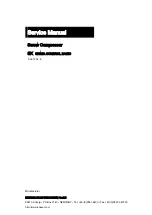
USER MANUAL
JEFC100L10B-230
100L
BELT DRIVEN AIR COMPRESSOR
•
3HP
•
10Bar
•
230V
~
50Hz
USER MANUAL
JEFC100L10B-230
100L
BELT DRIVEN AIR COMPRESSOR
•
3HP
•
10Bar
•
230V
~
50Hz
www.jeffersontools.com
www.jeffersontools.com
6
7
1. Air Resevoir Tank
9. Pressure Switch
2. Tank Rating Plate
10. Pressure Gauge
3. Pressure Regulator
11. Handle
4. Pressure Gauge
12. Oil Sight Level Glass
5. Air Outlet / Air Line Coupling
13. Check Valve
6. Belt Guard
14. Front Wheel
7. Motor Assembly
15. Tank Drain Valve
8. Pump Assembly
16. Rear Wheels
4
3
16
1
9
10
11
12
15
14
8
7
EQUIPMENT IDENTIFICATION
2
5
6
13
Check oil Level:
Before using the compressor check the oil level
using the dipstick. If the oil is not up to the mark it
should be topped up with
Jefferson HT68
Compressor Oil
(
see
Fig.6
).
Sight glass / Oil Level:
The compressor oil level can be viewed through the
sight glass; the compressor must be on a level
surface to measure the oil level through the sight
glass accurately (see
Fig.7
):
•
The top of the red dot indicates the full mark
•
The bottom of the red dot indicates the low mark
Important:
Always ensure that the oil level is correct before operating the compressor.
Ensure working environment is suitable for use:
This compressor must be used on a flat, level surface The maximum safe operating angle
in any direction is 10° degrees (see
Fig.8)
.
•
Do not operate the compressor on inclines in excess of 10° degrees.
•
Serious damage to pump components may result from insufficient lubrication.
•
Never use the air compressor on a rooftop or elevated position that could allow the
unit to fall or be tipped over.
•
Use additional air hose for elevated jobs.
Check power supply is correct for this compressor:
It is essential that the air compressor has an adequate power supply.
Always utilize more air hose before choosing to use an extension lead, as low voltage could cause
damage to the motor. (Low voltage damage is not covered under warranty)
Read and understand all the electrical safety guidelines laid out in this manual, follow all applicable local authority safety guidelines.
BEFORE FIRST USE
Fig.6
Fig.7
Fig.8
Fig.8
10
°































